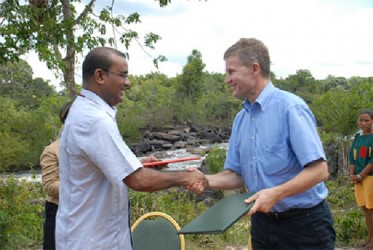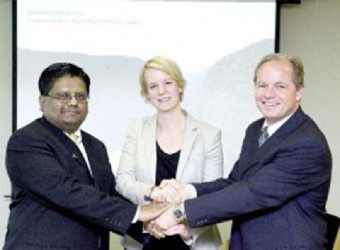More should be done for the timely disbursement of funds to Guyana, the Norwegian government agency through which monies are channelled to pay Guyana for protecting its forests, has said even as it urged the de-politicisation of Guyana’s Low Carbon Development Strategy (LCDS).
“One of the reasons that deforestation rates have increased in Guyana is that very little has been implemented to mitigate the impacts of mining, which is the main driver of deforestation.
In turn, one of the reasons very little has been done is because of the delay in disbursing funds from the Guyana REDD+ Investment Fund (GRIF), and so the existing financial set-up is implicated in the limited success in achieving NICFI’s climate objectives,” the Norwegian Agency for Development Cooperation (NORAD) said in a report released on Monday.
NORAD is a directorate under the Norwegian Ministry of Foreign Affairs and since 2010, it has been monitoring Norway’s International Climate and Forest Initiative (NICFI) via which Guyana is paid to protect its forest. Under the Guyana-Norway partnership inked in 2009, Guyana could earn up to US$250 million from Oslo in performance-based payments for the period up until 2015, based on an independent verification of Guyana’s deforestation and forest degradation rates and progress on REDD+ enabling activities. REDD+ is a global initiative that aims to reduce greenhouse gas emissions from deforestation and forest degradation.

In its latest report, NORAD indicated that it sees a future for the forest protection pact and said that the NICFI should signal the continuation of the partnership as soon as possible in order to avoid a loss of momentum before the end of 2015, which would then need to be rebuilt during the following period.
However, it also recommended that Guyana “should be visited by a high-level, multi-disciplinary team” to discuss the reasons for the limitations to progress here and “whether and how NICFI support should be continued.”
NORAD said that NICFI can also help to maintain momentum for REDD+ between 2015 and 2020 by seeking to de-politicise the LCDS and increase bi-partisan involvement in the Multi-Stakeholder Steering Committee (MSSC). The agency pointed out that although it had previously urged a stronger bi- partisan approach to minimise the politicisation of the LCDS, this does not appear to have been achieved yet.
Political advantage
“At present the strategy is perceived as a mechanism for rewarding the government’s power base, and buying support from Amerindian communities,” NORAD said while adding that there is also the danger that opposition parties will seek political advantage from the delayed disbursement of funds from the GRIF. It also noted that political support for the LCDS, although, at least in the case of the opposition parties, not for a low carbon economy in general, could diminish across the political spectrum.
Further, NORAD pointed out that the combined opposition parties have gained a one-seat majority in the National Assembly and have been able to block government budget proposals relating to the strategy. “Although there has been widespread political support for the strategy in the past (and continues, at least in (underlying) principle), there appears to be growing opposition to the way specific ‘projects’/activities of the Low Carbon Development Strategy’s project portfolio, such as the Amaila Falls project, are being implemented,” the report said.
“The politicisation of aspects of the Low Carbon Development Strategy seems likely to increase, due to opposition party and civil society concerns about the way government appears to be trying to ‘control’ the Multi-Stakeholder Steering Committee and the use of the Strategy to favour the interests and perceived supporters of the government,” the agency added.
Clear communication

It said that the NICFI can also help to maintain momentum by providing clear communication on issues and concerns as they arise, for example, addressing the confusion over the Official Development Assistance (ODA) status of the funding, or the perception that REDD+ is an alternative to mining or logging, rather than being an incentive mechanism for undertaking low-impact mining and sustainable forest management. Providing clear communications on such issues would be greatly facilitated by having a NICFI representative/focal point in Guyana, NORAD said.
Meantime, the report said that one of the greatest concerns raised about the Guyana-Norway partnership is the slow disbursement of funds from the GRIF. Norway’s payments to Guyana are managed through the GRIF with the World Bank as trustee. Oslo has made three payments into the GRIF to date. Guyana’s deforestation rate has increased and payment for 2012 has been reduced by approximately US$20 million.
NORAD has noted that the Guyana-Norway partnership has been highly successful at developing a national-level monitoring, reporting and verification system, and reasonably successful at developing a financial mechanism for REDD+ payments. “Guyana is also the first country to have a national REDD+ funding mechanism, however, there are on-going concerns with the speed of disbursement, and further reform and development of the mechanism is needed. At present it does not represent a functioning ‘model’,” NORAD asserted.
NORAD said that almost all the stakeholders expressed concern about the slow disbursement of payments from the GRIF and noted that this was also raised as a concern four years earlier in the 2010 Guyana Country Report. The report said that government has cited the delay in disbursing funds as one of the barriers to implementing the enabling actions agreed to in the Joint Concept Note and this has also threatened the political and public acceptance of the Guyana-Norway partnership.
One major reason for the delay appears to be the time required to work through the World Bank’s and/or the Inter-American Development Bank’s (IDB), and/or the United Nations Development Programme’s (UNDP) procedures, including their safeguard compliance processes, NORAD said.
Capacity
It added that, however, the capacity of the Government of Guyana and the level of effectiveness of interaction between institutions are other factors. Apart from the World Bank, the current implementation partners are the IDB and the UNDP, and Conservation International is currently applying to become an additional implementation partner.
“Although there is serious concern about the impact of the delays, a number of stakeholders also commented that they believe the safeguard processes are important and necessary, particularly with regard to the financial safeguards. In addition, the use of intermediaries, such as the World Bank, may also have the benefit of ensuring the conditionality of a results- based payment approach, as they are not incentivised to disburse funds when the payment conditions are not met,” the report said. “On the other hand, the intermediary agency/ies should disburse funds as quickly and efficiently as possible when payment conditions are met, and at present the World Bank and other implementation partners are not incentivised to do so because their commission is not related to the efficiency or timeliness of disbursements,” it added.
The report said that in addition to the safeguard compliance process, respondents also suggested that some delays may be due to slow sign-off by the Guyana Ministry of Finance, and also the limited number of personnel available to develop “and a lack of a clear/transparent process for stakeholders to access” the project pipeline in the Guyanese Project Management Office.
There was also some confusion regarding the extent to which the expenditure approved by the GRIF Steering Committee would subsequently also go through a national parliamentary approval-by-voting process – apparently in an attempt to allow the Government of Guyana to report Norwegian funds as being part of their published national finances, the report said. It noted that this has given scope for opposition parties to vote against expenditure for the LCDS activities they feel have been politicised by the government.
Puzzlement
The report said that there is increasing awareness among Guyanese stakeholders of the fact that Norway’s payments under the bilateral agreement are classified as being ODA. “Previously the payments were viewed by most stakeholders as being ‘earned income’, and there is a sense of puzzlement and disillusionment with the funding modality and institutional/administrative arrangements. With the benefit of hindsight, communication on this issue could have been better from the start of the partnership, and clearer communication may still be needed to address any remaining confusion and frustrations,” the report said.
According to NORAD, international non-governmental organisations could offer an alternative route for disbursing funding. The agency said that stakeholders commented that international NGOs, such as Conservation International or WWF, might be a good alternative route for disbursing funds as they have experience in working with communities, and their overall organisational objectives are aligned with the objectives of the Guyana-Norway partnership.
“An alternative view was that using such NGOs would be a backward step in terms of sovereignty and accountability, and that there would be a risk of such NGOs being compromised, become financially dependent on managing such funds, and be(come) unprepared to be critical of the Government,” the report said.
However, it is unlikely that a highly critical NGO would be appropriate either, and political neutrality may be a necessary characteristic for ensuring the efficient disbursement of funding, NOIRAD said. It noted that other alternatives suggested by stakeholders are a sovereign trust fund, direct bilateral disbursement from NORAD and individual payments to all citizens/voters in Guyana.
The agency noted that the development banks may be most appropriate fund managers for large capital projects, or projects where there is a high financial or fiduciary risk, and that other more flexible intermediaries, such as out-sourced disbursement agents or international NGOs, could disburse/ manage funding for smaller or less risky or NGO projects. “Another possibility is to have a revolving fund that is able to disburse small amounts of funding more quickly,” the report noted.
Project pipeline
It observed that access to the project pipeline for the GRIF appears to be tightly controlled and most stakeholders did not know if or how they could propose projects for funding through the GRIF. In some cases government agencies such as the Environmental Protection Agency had ideas for interventions to reduce deforestation, or had limited resources for forest protection activities, but did not consider the GRIF as a possible source of funding.
“Other stakeholders commented that the first phase of projects was assumed to be restricted to government-nominated projects, and that the pipeline would be more open to proposals from other groups after that, e.g. with public calls for proposals. However, due to the slow disbursement of funding, five years after establishment this second phase has not yet been reached,” NORAD said.
It added that the restriction of access to the project pipeline may be justified by the fact that the amount of funding available is limited, and there are also high administrative costs associated with developing project proposals.
However, opening access to the project-pipeline could help to de-politicise the LCDS and avoid the current perception that it is being used to favour the Government’s perceived electoral power bases, the report asserted.





